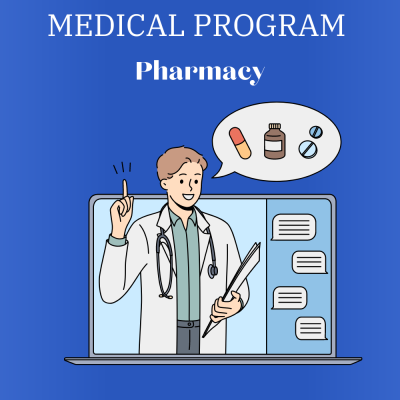

Exploring the Pharmacy Profession:
Pharmacy is an important healthcare profession that ensures the safe and effective use of pharmaceuticals to improve patient outcomes and quality of life. Pharmacists play an important role in healthcare settings because they dispense medications, oversee pharmaceutical therapy, coach patients on correct medication usage, and collaborate with other healthcare professionals to improve patient care.
University
40+
Duration
4 years
Eligibility
Itermediate
Program Overview:
Our comprehensive Pharmacy Programme combines scientific knowledge, clinical skills, and professional growth to equip you for the various tasks of a pharmacist. You will study about pharmaceutical sciences, medication therapy management, patient care, and healthcare delivery through a mix of classroom lectures, laboratory work, experiential learning, and clinical rotations.
Roles and Responsibilities of Pharmacists:
1. Pharmaceutical Sciences: Learn about the chemical, physical, and biological aspects of medications, as well as their methods of action and interactions in the body.
2. Pharmacology and Pharmacotherapy: Learn about the effects of medications on the body, drug action mechanisms, therapeutic applications, side effects, and drug interactions, as well as how to evaluate drug therapy alternatives and make suitable recommendations for patients.
3. Pharmacy Practice and Patient Care: Learn about medication counselling, prescription processing, drug dispensing, medication therapy management, and patient counselling, as well as how to work with healthcare providers to improve patient outcomes.
4. Clinical Pharmacy and Therapeutics: Gain practical experience in clinical settings such as hospitals, clinics, and healthcare facilities by participating in patient rounds, medication reviews, therapeutic drug monitoring, and interdisciplinary patient care teams.
5. Pharmaceutical Compounding and Dispensing: Discover the art and science of pharmaceutical compounding, where you will create customised drugs, dosage forms, and formulas based on unique patient needs and preferences.
6. Pharmacy Law and Ethics: Learn about chemists’ legal and ethical duties, such as regulatory compliance, patient confidentiality, controlled substance rules, and professional standards of practice.
7. Research and Innovation: Participate in pharmacy research projects, academic activities, and evidence-based practice initiatives that will advance the field of pharmacy via scientific inquiry and innovation.
Education and Training:
Becoming a chemist takes substantial study and training.
1. Undergraduate Education: Many chemists earn a bachelor’s degree in pharmacy or a related discipline, though the requirements may differ by country or location.
2. Doctor of Pharmacy (Pharm.D.) Program: Pharmacists must complete a recognised Pharm.D. program, which usually takes four years of study. Pharm.D. programs teach pharmacology, medicinal chemistry, pharmaceutics, pharmacotherapy, and pharmacy law.
3. Pharmacists must be licenced to practice in their respective jurisdictions. This usually entails completing national board exams, such as the North American Pharmacist Licensure Examination (NAPLEX) in the United States.
4. Continuing Education: Pharmacists must participate in continuing education to keep their licensure and stay current on advances in pharmacy practice, pharmaceutical therapy, and healthcare regulations.
Career Opportunities:
Pharmacists can advance their careers in a variety of healthcare settings, including:
Community pharmacies are retail locations where pharmacists provide direct patient care, distribute drugs, and offer medication counselling.
Pharmacists work in hospitals alongside healthcare teams to ensure proper medication usage, manage pharmaceutical delivery systems, and provide clinical pharmacy services.
Clinical pharmacy: Pharmacists might specialise in ambulatory care, critical care, oncology, infectious diseases, or mental pharmacy, offering specialised medication management services to a wide range of patient populations.
Conclusion
Pharmacy is an exciting and gratifying career that has a substantial impact on patient care and public health. Pharmacists play an important role in medication management, ensuring that pharmaceuticals are used safely, effectively, and rationally to improve patient outcomes and quality of life. As trustworthy healthcare experts, chemists are important members of interdisciplinary healthcare teams, working cooperatively to optimise patient care and promote medicines.
Admission Requirements:
- You need to have a 12th pass from a recognised board of education.
- Are you ready to start an exciting path towards a career in aviation? To apply for our pharmacy program, follow the steps below:










Right Location, Affordable Fees And Right Education!

